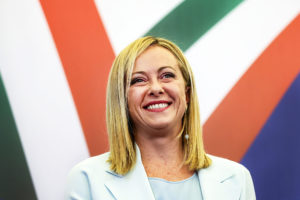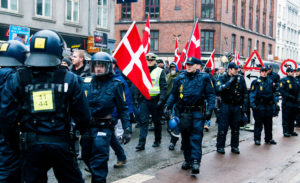I will always remember the thrill I felt when I read that a group of Hungarian university students and young intellectuals had established an “illegal political organisation” on 8 April 1988. The Federation of Young Democrats (Fidesz) was a courageous, energetic and politically-conscious crowd, who brought a spark of excitement to sleepy late-communist Hungary.
I had good reasons for wanting to join them. My parents and grandparents were active during the 1956 anti-Stalinist revolution and raised me and my siblings in the anti-communist tradition.
Within six months of joining Fidesz, I became an elected member of the party’s board. I stood next to Viktor Orbán in 1989 as he delivered his now-historic speech at the reburial of the former prime minister Imre Nagy. We were fighting for liberal democratic principles and wanted to build a strong European democracy; in 1990, we entered Hungary’s National Assembly in Hungary’s first free and fair elections.
In parliament, Fidesz was highly critical of Hungary’s Right-wing government coalition. Our principles were consistently liberal and we deliberately positioned ourselves in the centre of the political arena. Orbán said in 1992 that the “fate of the country can only be improved by a civic liberal government… which does not give in to the temptation of either Right or Left-wing statist economic policy.”
Some politicians in Fidesz, however, felt that the party would never lead from the centre. A bitter rivalry broke out with the other liberal party, the Alliance of Free Democrats (SZDSZ), and the liberal-centrist strategy soon became a minority position within Fidesz. Those who continued to espouse this view were bullied and humiliated.
In this hostile political climate, Orbán was elected as Fidesz party chair in 1993. That same year, a financial scandal broke out involving Fidesz investment of hundreds of millions of Hungarian forints in businesses linked to Orbán’s friend and financial advisor, Lajos Simicska. It quickly became clear that Orbán would not allow anyone to obstruct his intermingling of party funds and political power. For politicians like myself, who still upheld Fidesz’s founding liberal ideals, this was a step too far. Together, we left the party.
From that point on, Orbán had a free hand to pull Fidesz to the Right — where he saw a political vacuum and an opportunity to build a party capable of winning power. In his speeches, he drew a sharp line between the “post-communist liberal elite supported by international capital” and Fidesz’s so-called “civic union”. Anti-communism, nationalism, and Christianity served to bond Right-wing voters to Fidesz, as part of its newly shaped conservative identity.
Orbán’s gamble soon paid off; his refashioned Fidesz party beat the ruling socialist-liberal coalition in Hungary’s 1998 election. His first premiership was undeniably successful. In just four years, the country’s economic position rebounded, following a period of austerity; Hungary joined Nato; and the government undertook negotiations to join the European Union. But this run would not last, and, in 2002, Fidesz was kicked out of office.
Shortly after losing power, Orbán called his supporters together and gave a powerful speech. “It may be that our parties and MPs are in the opposition in parliament, but we here in this square are not and can never be in the opposition, because the homeland [nation] cannot be in the opposition.”
It was an act of Machiavellian genius. In that moment, Orbán claimed for himself the right to represent all Hungarians. He was portrayed as a hero by Fidesz-built media and Right-wing columnists, and was given free rein to spread his polarised agenda. Fidesz became, exclusively, Orbán’s party — and the party’s appeal now encompassed supporters from the centre to the far-Right.
In 2010, Fidesz won a landslide victory, which Orbán saw as a personal mandate giving him free rein to rewrite the rules of government. His actions ever since have followed an autocratic playbook. For some time, I witnessed this first-hand as an MP for the “Together” party, which was established to build an alliance of democratic opposition parties to challenge the erosion of democratic norms in Hungary. Orbán’s party has rewritten and amended the constitution; elections rules have been modified 20 times, paralysing opposition parties; and Fidesz has heaped pressure on the independent judiciary. Orbán has also built a loyal new business elite with the help of billions of EU funds, all the while leading anti-EU campaigns: most recently agitating against the bloc’s sanctions on Russia.
In 2014, Orbán himself declared his regime an “illiberal state”. Two years later, at the 60th anniversary of the 1956 revolution, a year-long government-funded celebration began to rewrite our country’s history. It overlooked the role of prime minister Imre Nagy in leading the revolution, and hardly mentioned the Soviet troops who crushed Hungary’s freedom fight. The festivities were part of Orbán’s attempt to transform our traditionally-negative feelings towards Russia; in recent years, he has developed close ties with the Kremlin.
In Orbán’s view, the age of Western dominance is over, and alliances with Vladimir Putin and Xi Jinping are the future. As such, he has sought to open Hungary’s economy to the East, in doing so distancing himself from his 2007 position: “Hold out for a Western Hungary; don’t let them divert Hungary from this path. Love the fact that Hungary is a Western country, which means we believe in the freedom of human will… Oil might come from the East, but freedom always comes from the West.”
A political shapeshifter, Orbán appears to have no trouble burning bridges. He has openly smeared Western organisations, such as the IMF and claimed that opposition parties and critical NGOs are seeking to “destroy” Hungary. He has accused the EU of attempting to “colonise” Hungary, while taking opaque loans for giga-projects financed by the Chinese and Russian state.
What do Hungarians make of all this? Colossal amounts of government funds are devoted to party messaging and costly smear campaigns to mobilise Fidesz’s anti-communist-nationalist base. Orbán, who has avoided public debates for 15 years, gives sarcastic, five-word answers in our country’s equivalent of PMQs, such as “I don’t deal with business matters” or “Happy Christmas, Mrs Deputy!”. For those Hungarians who buy into his rhetoric about elevating Hungary’s place in the world, and may have helped propel him to a surprise victory in April’s election, Orbán’s ever-radicalising path is an acceptable means to an end.
Yet his illiberal experiment may return to haunt him. His shift to the Right places him in a political camp made up of Eastern autocrats, Donald Trump, and the European hard-Right — and, to ensure his survival, he has no choice but to continue along this path. Perhaps that’s why earlier this year, at the American Conservative Political Action Conference (CPAC), he called for taking back political institutions in Washington and Brussels, and coordinating the movement of US and Hungarian troops.
For a time, Orbán managed to tread a fine line in his dealings with Western allies and Eastern autocrats. Now, this is not so easy. Hungary desperately needs EU funds, with Russia’s war in Ukraine threatening its energy supplies, and inflation spiralling out of control. Although Orbán appears on the cusp of striking a deal with the bloc — EU funding in return for strict rule-of-law concessions — tensions will remain high. So far, his Machiavellian instincts have proved successful — but European partners are more alert today, and Orbán may not get away with his divisive strategies.
Disclaimer
Some of the posts we share are controversial and we do not necessarily agree with them in the whole extend. Sometimes we agree with the content or part of it but we do not agree with the narration or language. Nevertheless we find them somehow interesting, valuable and/or informative or we share them, because we strongly believe in freedom of speech, free press and journalism. We strongly encourage you to have a critical approach to all the content, do your own research and analysis to build your own opinion.
We would be glad to have your feedback.
Source: UnHerd Read the original article here: https://unherd.com/




